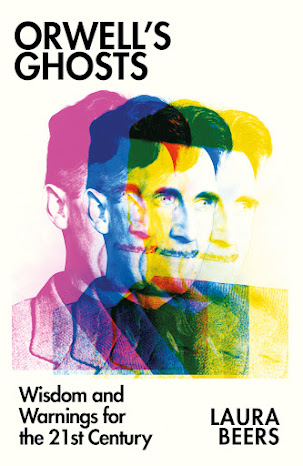In the year 2024, it’s indeed a surprise to describe the relevance of George Orwell as an author and as a cultural product. Orwell’s endearing fame as a writer and a thinker, and his critique of authoritarianism with the emphasis on disinformation, manifests itself in Animal Farm and Nineteen Eighty-Four, two of his dystopian novels translated into an excess of 65 languages. Both books are on best-selling lists even now. Published within a gap of four years in 1945 and 1949, the language of both the novels continues to echo across politics and culture. The world that Orwell prophesied hasn’t come to pass, on the contrary, his words offer sharp lessons for the contemporary world, says Laura Beers in her new book, Orwell’s Ghosts (2024). In her Introduction, the British historian who teaches at American University writes that invocations of Orwell’s words have reached new heights, with both the right and the left appropriating them to suit their ends.
After the January 6, 2021 “insurrection” at Capitol Hill in Washington D.C., Republican senator Josh Hawley compared the cancellation of his book contract to life in Orwell’s Nineteen Eighty Four, notes Beers. The left too, she writes, has embraced the rhetoric of Orwellianism to depict either Donald Trump or Boris Johnson. The term, Orwellian, has been used to depict Vladimir Putin’s “attempts to manage information on the Ukraine war.”
She quotes the literary scholar John Rodden who in a study made a distinction between Orwell the man and “Orwell”, the cultural product, which offers a valuable lens for considering how both Orwell and his books have been repeatedly reappropriated for various political ends.
‘Big Brother’ is still a synonym for a totalitarian surveillance state, which has recently been co-opted as the title of a popular reality show. Orwell questioned the presence of the ‘big brother’ and the surveillance state, contending that both reflect the emergence of a fascist state. The Spanish Civil War was a crucial turning point in Orwell’s life; both the novels came after the civil war, and a newfound commitment to socialism. Had Spain not awakened Orwell to write these iconic books, he would not have championed individual liberty as a cause. Beers says Orwell was a “broad and deep thinker who opposed inequality as fervently as he opposed censorship and tyranny.”
“The real frightening thing about totalitarianism,” said Orwell, “is not that it commits ‘atrocities’ but that it attacks the concept of objective truth; it claims to control the past as well as the future.” The attack on truth and language makes atrocities possible. The atrocities are easy to commit, if truth has been silenced as the first victim. Once people are terrorized into silence, obedience, and lies, it becomes easier for an authoritarian administration to take the next steps. Beers shows why the present generation must value Orwell’s politics and what must be learnt from his thoughts. Although he died in 1950, when he was only 47, his life was full of eventful and interesting episodes. Orwell’s childhood seems to have been divided between the freedom and the pleasure of life outdoors, and the regimentation and misery of the schools he lived at from age eight to eighteen.
Beers says the question that bedeviled Orwell for the final dozen years of his life was whether and how a socialist society could be achieved that offered its citizens economic security and social equality without devolving into authoritarianism. She warns against replacing the complexity of his political thought with a two-dimensional caricature of Orwell as an anti-totalitarian prophet. In considering his writing, Beers draws attention to at least “one blind spot”, his inability to appreciate the negative impact of patriarchal structures on interwar women. “Orwell was a socialist, but decidedly not a feminist,” she notes.
Though he wasn’t exemplary, argues Rebecca Solnit, he was nevertheless courageous and committed. Orwell managed to love both Englishmen and loathe the British Empire, to be an advocate for underdogs and outsiders. “He was a rebel against his own biological condition, and he was a rebel against social conditions; the two were very closely linked together.” Solnit’s Orwell’s Roses challenges the conventional image of Orwell as a gloomy figure always fighting for a cause. The commitment to the things of this world could also be the focus of a spiritual discipline, a warmth he saw Gandhi was lacking. Our job is to make life worth living on this earth, Gandhi had said, because this is the only earth we have.
Orwell’s Ghosts and Orwell’s Roses are two contrasting studies. While the first explores his commitment to political liberty and economic justice, the second examines his aesthetics and ethics. If one were to count Orwell’s single achievement, it would be the fact that he named and described, as no one else had, the way that totalitarianism was a threat not just to liberty and human rights, but to language and consciousness as well. His essays laid the ground for his diverse political thoughts. Without doubt, Orwell is the perfect guide to our own age of upheaval.
Orwell’s sense of social justice was his most outstanding characteristic, his friends attest. In the nearly seventy-five years since his death, the emphasis of his political thought is well established. While we must stand up against oppressive regimes abroad, we must also take ownership of how and why similar populist and anti-democratic tendencies are corrupting our domestic political system. Orwell took a dim view of the role of religion in society; he believed it principally divided society. Revisiting Orwell is like visiting our recent pasts and our current upheaval. The work he did is everyone’s job now.
Orwell’s
Roses
by Rebecca
Solnit
Granta, London
Extent:308, Price: UK 9.99.
Orwell’s Ghosts
by Laura Beers
Hurst, London
Extent: 222, Price: Rs. 399.
First published at The Hindu, dated Oct 17, 2024.


No comments:
Post a Comment